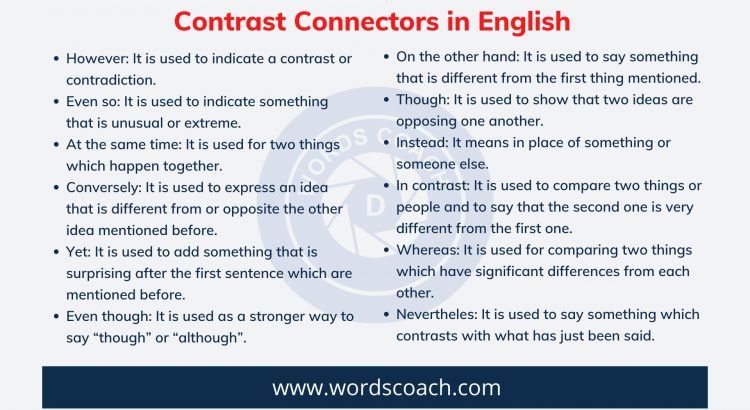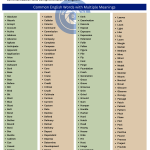Connectors: A connector is a device that joins two pieces of equipment, wire, or piping together.
What are the different types of connectors?
- Sequence Connectors
- Addition Connectors
- Cause & Effect Connectors
- Contrast Connectors
- Emphasis Connectors
- Comparison Connectors
Contrast Connectors
Contrast connectors are used to present a contradiction between ideas. This is where connectors such as however, although, nevertheless, and in spite of being used.
Example: I think his idea is great. Nonetheless, it’s too expensive.
Contrast Connector List
| But | However |
| On the other hand | At the same time |
| Otherwise | Unlike |
| Conversely | In spite of |
| Whereas | While |
| Yet | Apart from |
| Nevertheless | On the contrary |
| Even so | Notwithstanding |
| Though | Alternatively |
| Instead | Nonetheless |
| By contrast | In contrast |
| Although | Even though |
| Despite / In spite of |
Contrast Connectors with Examples
However: It is used to indicate a contrast or contradiction.
Examples:
- That man has much money. However, he isn’t happy at all.
- I respect my best friend’s ideas however we do not have the same thoughts.
On the other hand: It is used to say something that is different from the first thing mentioned.
Examples:
- I like playing football. On the other hand, my brother likes playing basketball.
- We had no money but, on the other hand, we were very happy.
Even so: It is used to indicate something that is unusual or extreme.
Examples:
- This hypothesis is true, but even so, further research is required.
- Your thoughts are very fanciful, but even so, they are worth to imagine.
Though: It is used to show that two ideas are opposing one another.
Examples:
- Though the meal was spicy, it was really delicious.
- Though he loves his teacher very much, he did not get used to his friends.
At the same time: It is used for two things which happen together.
Examples:
- This is so people can watch TV and play playstation games at the same time.
- I study architecture at university. At the same time, I work part-time at a firm.
Instead: It means in place of something or someone else.
Examples:
- Would you like to go to another place instead of cinema?
- Instead of complaining, you should try to be a constructivist.
Conversely: It is used to express an idea that is different from or opposite the other idea mentioned before.
Examples:
- I thought she would not come to the party; conversely, she came to the party with her boy friend.
- His family made a lot of effort to make their son’s lessons better, conversely, he never made any effort.
In contrast: It is used to compare two things or people and to say that the second one is very different from the first one.
Examples:
- This child is short and fat. In contrast, her sister is tall and thin.
- In contrast to his big brother, he speaks English very well.
Yet: It is used to add something that is surprising after the first sentence which are mentioned before.
Examples:
- It’s a long-term business, yet it’s more fun than other jobs.
- That woman was short and overweight, yet somehow, she was attractive.
Whereas: It is used for comparing two things which have significant differences from each other.
Examples:
- Chicken meat is white, whereas cow meat is red.
- Her hair has a natural wave, whereas her sister’s hair just straight.
Even though: It is used as a stronger way to say “though” or “although”.
Examples:
- Even though I met all the criteria needed for the job, I was not hired.
- My father will go to the work, even though he has two painful operations.
Nevertheles: It is used to say something which contrasts with what has just been said.
Examples:
- The place was so beautiful; nevertheless, we did not want to spend our holiday in here.
- They lost the game; nevertheless, they continued to play.
Notwithstanding: It means despite the thing mentioned.
Examples:
- He continues to exhibit the same behaviors, our warnings notwithstanding.
- Notwithstandig two players getting red card, the team won the game.
Alternatively: It is used to propose another possibility.
Examples:
- You can play football. Alternatively, you can go to the cinema with me.
- I think we can go far away for vacation, or alternatively, we can go where we went last year.
Nonetheless: It is used to link two contradictory thoughts.
Examples:
- She did not like teaching, but she became a teacher nonetheless.
- The food was unsalted,but it was nonetheless delicious.
But: It is used to add statement which is different from what you have said before.
Examples:
- I know the answer to the problem, but I do not know why it is.
- They heard us but they did not understand what we said.
While: throughout the time
Examples:
- While you were pregnant, my little girl was one year old.
- While John was in London, he went to see Jully.
Although: It is used for introducing a new statement that makes main statement surprising.
Examples:
- Although she loves her job, she decided to quit her job.
- Although he works hard, he is not successful in the course.
Read More.
| Important Connectors and Examples | Compound Words |
| 100+ Examples of Negative Sentences in English | 150+ Examples of Positive Sentences in English |






